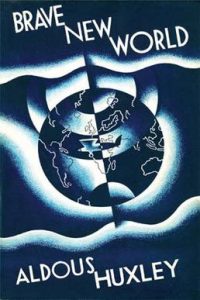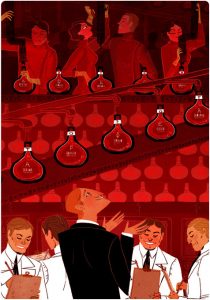Oppression Through Instant Gratification:
Aldous Huxley’s Brave New World (1932) and Human Rights
by Efehan Boyacıoğlu

Brave New World is a dystopian fiction that was written in 1931 by Aldous Huxley. One of the most significant differences between our world and Brave New World’s “World State Society” is that babies are produced in bottles; birth is non-existent in the World State Society. The notion of family, the core institution of our society, is banished and remembered as something disgusting by the leader of the World State Society, Mustapha Mond. After being produced in the bottles, babies are divided into five groups (Alpha, Beta, Delta, Gamma, Epsilon) and conditioned to be perfect examples of their caste. In a world where there are such prominent distinctions, people are prevented from uniting against laws that could possibly violate their rights. Aldous Huxley creates a dictatorship by giving the World State Society certain characteristics: consumerism, promiscuity, groupthink, rejection of solitude and discrimination. The Director of the Central London Hatchery and Conditioning Centre says: “The secret of happiness and virtue is liking what you’ve got to do.” In this dystopic world, people are trained to love their oppression through technology and industrial advancement.
Members of the society are also conditioned to engage in economic consumption and to use a drug called “soma” whenever they feel uncomfortable. This prevents any possible revolts against the status quo. They are conditioned to constantly seek instant gratification through the drug soma, and to be sexually promiscuous.
The Savage (John) is an important character in the novel as he is the ultimate outsider. He was excluded from the society and was secretly studying Shakespeare in his hometown, New Mexico. John is eager to see the World State Society, but when he visits there, he finds the culture as immoral, and degrading to humanity. As he visits the new world, he feels more alienated because his longing for the old world, his knowledge, and his sense of morality are not recognized. However, people find him very interesting, and he is objectified because of his extraordinary image and behaviour. He becomes a popular icon for all the wrong reasons. “In fact,” says Mustapha Mond, “you’re claiming the right to be unhappy.” “All right then,” says John, “I’m claiming the right to be unhappy.” John’s response signifies that he rather wants the ambiguity, with its upsides and downsides, of living outside the cruel regime, as long as he retains his freedom. The “right to be unhappy” is what gives life a meaning, and John knows this.
Brave New World is a perfect example of how a seemingly benevolent dictatorship can change the society in terrible ways. Aldous Huxley suggests that individual freedom and human rights cannot be retained in a world that targets them as a threat to its own existence.

